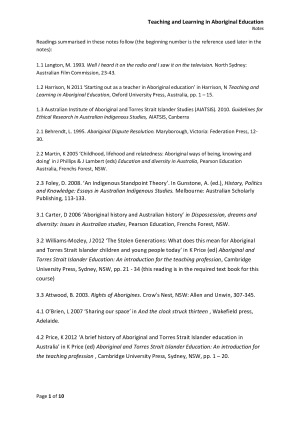Teaching and Learning in Aboriginal Education Subject Notes
Subject notes for UniSA EDUC 2061
Description
I received a high distinction for this subject and my overall graduating GPA is This document contains all of my personal notes for this course, including detailed notes from the required readings. Endless hours of study are condensed in just over 44 pages. My personal style when taking notes from readings is to begin with the title and then record any important facts/information underneath usually in dot points. Most of the time I would also reference at the end of the dot point what page number that information was found on which is particularly useful during assessment times when referencing or if you need to locate that information again in the reading. Often direct quotes have been recorded, avoiding the need to refer back to the actual reading. The topics covered are: Week 1: Representation, Ethics and Teacher Education Week 2: Aboriginal Cultures and Knowledge Week 3: Aboriginal Histories Week 4: History of Aboriginal Education Week 5: Contemporary Aboriginal Issues and Education Week 6: Education and reconciliation Week 7: Education and reconciliation Week 8: teaching Aboriginal studies The readings summarised include: Langton, M. 1993. Well I heard it on the radio and I saw it on the television. North Sydney: Australian Film Commission, 23-43. Harrison, N 2011 ‘Starting out as a teacher in Aboriginal education’ in Harrison, N Teaching and Learning in Aboriginal Education, Oxford University Press, Australia, pp. 1 – 15. Australian Institute of Aboriginal and Torres Strait Islander Studies (AIATSIS). 2010. Guidelines for Ethical Research in Australian Indigenous Studies, AIATSIS, Canberra Behrendt, L. 1995. Aboriginal Dispute Resolution. Maryborough, Victoria: Federation Press, 12-30. Martin, K 2005 ‘Childhood, lifehood and relatedness: Aboriginal ways of being, knowing and doing’ in J Phillips & J Lambert (eds) Education and diversity in Australia, Pearson Education Australia, Frenchs Forest, NSW. Foley, D. 2008. ‘An Indigenous Standpoint Theory’. In Gunstone, A. (ed.), History, Politics and Knowledge: Essays in Australian Indigenous Studies. Melbourne: Australian Scholarly Publishing, 113-133. Carter, D 2006 ‘Aboriginal history and Australian history’ in Dispossession, dreams and diversity: Issues in Australian studies, Pearson Education, Frenchs Forest, NSW. Williams-Mozley, J 2012 ‘The Stolen Generations: What does this mean for Aboriginal and Torres Strait Islander children and young people today’ in K Price (ed) Aboriginal and Torres Strait Islander Education: An introduction for the teaching profession, Cambridge University Press, Sydney, NSW, pp. 21 - 34 (this reading is in the required text book for this course) Attwood, B. 2003. Rights of Aborigines. Crow’s Nest, NSW: Allen and Unwin, 307-345. O’Brien, L 2007 ‘Sharing our space’ in And the clock struck thirteen , Wakefield press, Adelaide. Price, K 2012 ‘A brief history of Aboriginal and Torres Strait Islander education in Australia’ in K Price (ed) Aboriginal and Torres Strait Islander Education: An introduction for the teaching profession , Cambridge University Press, Sydney, NSW, pp. 1 – 20. Beresford, Q. 2012. ‘Separate and unequal: An outline of Aboriginal Education ’. In Beresford, Q., Partington, G. and Gower, G. (eds.), Reform and Resistance in Aboriginal Education, UWA Publishing. Alissa Macoun (2011) Aboriginality and the Northern Territory Intervention, Australian Journal of Political Science, 46:3, 519-534 Gunstone, A. 2012. ‘Indigenous education : Documents, outcomes and governments’. Australian Journal of Indigenous Education41(2): 75-84. Short, D. 2005. ‘Reconciliation as Education: the Council and the ‘Peoples Movement’. Journal of Australian Indigenous issues, 8(3-4): 33-52. Gunstone, A. 2007. ‘Community Involvement and Education in the Australian Reconciliation Process’. Australian Journal of Indigenous Education 36: 39-48. Zembylas, M. 2007. ‘The politics of trauma: empathy, reconciliation and peace education’. Journal of Peace Education 4(2): 207-224. Harrison 2011 ‘Building community trust and collaboration in teaching and learning in Aboriginal education. Evans, C 2012 ‘Your professional experience and becoming professional about working with Aboriginal and Torres Strait Islander students and communities’ in K Price (ed) Aboriginal and Torres Strait Islander Education: An introduction for the teaching profession, Cambridge University Press, Sydney, NSW, pp. 52 – 63. Gollan, S and Malin m, 2012 ‘Teachers and families working together to build stronger futures for our children in school’ in Q Beresford, G Partington & G Gower (eds) Reform and Resistance in Aboriginal Education, UWA Publishing, pp. 149 -174. Buckskin, P 2012 ‘Engaging Indigenous students: The important relationship between Aboriginal and Torres Strait Islander students and their teachers’ in K Price (ed) Aboriginal and Torres Strait Islander Education: An introduction for the teaching profession, Cambridge University Press, Sydney, NSW, pp. 164 – 180 Price, K 2012 ‘Aboriginal and Torres Strait Islander Studies in the Classroom’ in K Price (ed) Aboriginal and Torres Strait Islander Education: An introduction for the teaching profession, Cambridge University Press, Sydney, NSW, pp. 151 – 163. Craven, R 2011 ‘Why teach Aboriginal Studies?’ in R Craven (ed) Teaching Aboriginal Studies: A practical resource for primary and secondary teaching, Allen and Unwin, Crows Nest NSW, pp. 1 – 21.
UniSA
Semester 2, 2016
44 pages
15,904 words
$34.00
